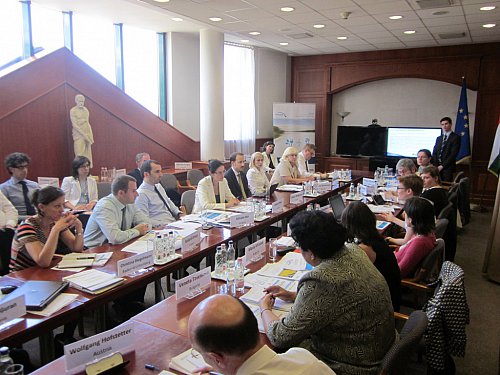BOOSTING MACRO-REGIONAL COOPERATION: THE 6TH STEERING GROUP MEETING OF THE PA2
The 6th Steering Group (SG) Meeting of the Priority Area 2 was held on the 13th of June in Budapest at the Ministry of Foreign Affairs. Besides representatives of Danube countries, the EU’s Joint Research Centre as well as the European Commission’s DG ENER and DG REGIO attended the meeting.
The aim of the event was to assess and evaluate the results up to date and to pave a way for future projects. A key topic for the Priority Area was to introduce the findings of the Danube Region Gas Storage Analysis. The analysis showed that the Danube Region as a whole has sufficient storage capacities but with uneven distribution across countries. The results also outlined that as the markets become more interconnected and competitive, storage can be substituted partly by other means of flexibility that is new interconnectors. The Danube countries, in their joint declaration agreed on the need for regional cooperation mechanisms for the effective use of already available storage capacities.
Furthermore, a progress report on the Danube Region Smart Grid concept was presented, dealing with the question of smart grids on a macro regional level. Subsequent reports discussed the Danube Region Biomass Concept (to extend the use of biomass in the region) and the Danube Region Geothermal Concept. The latter project aims at the creation of a Danube region-wide consortium for a geothermal pilot project to be launched in 2014. The results of the training program on the 3rd EU Energy Package in Moldova were concluded in front of the members. The Steering Group discussed a new concept proposal titled “Danube Region Energy Efficiency Concept for Public Buildings” to reduce the energy consumption of public buildings in the region in order to meet the EU 2020 goals.
The Steering Group also accepted a joint declaration on Biomass Sustainability. The joint position states that new EU-wide obligatory sustainability criteria would unavoidably create additional administration and costs especially for the EU producers, without any additional benefit for the environment, thus creating market distortion and disadvantages in competition for the producers of the Member States. Moreover, a new and less detailed EU biomass sustainability criteria system would possibly devalue and erode the existing well developed and widely accepted national criteria, indicator and monitoring systems. The decisions will be forwarded to relevant institutions on EU level as a common position of DRS countries.
As for future projects, the Steering Group accepted two new project proposals and supported them with a letter of recommendation. The first initiative is the “Energy Performance Contracting in the Danube Region” led by GIZ (Gesellschaft für Internationale Zusammenarbeit). The other initiative is the SUSBANAT concept (Good Neighbours for Sustainable Investments in the Banat Region) with BTC EGTC (Banat Triplex Confinium European Grouping of Territorial Cooperation Limited) working as a lead partner. Both projects were submitted to the Intelligent Energy Europe’s call.
The next meeting of the Steering Group will be organized around mid-November with the annual stakeholder seminar of PA2.
Presentations:
ÁRVAY_SG6_presentation_DR-EECfPB_v3
DIEGELMANN_Steering_Group_PA2_BDCP_Einsatz
ESSŐSY_BTC_SUSBANAT_végleges_2013-06-21
Gabor_Szorenyi_ERRA_PA2_progress_report_June_13_Bp
JRC_BioEnergyNexus_Budapest_13_June
KADERJÁK_TÓTH_REKK+Storage+Report
KRABATSCH_PA2_Steering_Group_Meeting_Budapest


